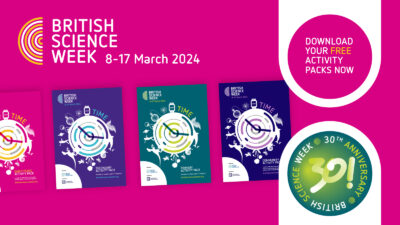That’s a wrap on British Science Week’s 30th anniversary! We hope you had a brilliant time celebrating science, technology, engineering and maths – we loved seeing all the fun you had running events and activities! Do keep tagging us on social media with photos and videos with @ScienceWeekUK with the hashtag #BSW24.
The Week may have ended for another year, but the fun doesn’t need to stop. There are loads of resources still available that you can use to keep the excitement about science engagement going all year round.
Activity packs
All four activity packs are still available to download FREE from our website, where you’ll also find an archive of packs dating back to 2018!
The activities align with the curriculum, so can be incorporated into lesson plans, used in after-school STEM* clubs, at home or in community group settings. The activities could even inspire a project for a CREST Award.
Why not put ‘Nature’s fun’ – an activity in the Primary pack that lets children consider how they could make their school grounds more biodiverse – towards a SuperStar CREST Passport.
Older children could adapt ‘How much rain?’, and many activities besides, from the Secondary pack into a Bronze CREST project.
Smashing Stereotypes
Our cracking collection of over 50 Smashing Stereotypes profiles is available all year, and can be used to demonstrate to children and adults alike the diversity of STEM professionals and their roles. This year we added our Smashing Stereotypes classroom resource to the library, a brilliant deck of slides designed to spark discussion and empower young people to think about following a STEM path.
This year’s profiles include Tumi Siwoku, a cosmetics innovator who uses her expertise in chemistry to design skin care and other products. Joining her in the 2024 cohort is education app developer André Skepple. Inspired by his own experiences with dyslexia, André founded FullSpektrum, an app that uses AI and other technologies to provide a hyper-personalised support service for neurodiverse learners.
We’ve made a series of short films showcasing some of our profiles, in which they reveal why they’ve chosen a career in science, how they followed their passions, and the stereotypes they’ve smashed along the way.
This year, the first day of British Science Week fell on International Women’s Day. To celebrate this happy coincidence, we published a blog highlighting the women in this year’s Smashing Stereotypes collection, and how they can inspire girls in particular.
Nature’s Calendar
This year, we partnered with the Woodland Trust on their 300-year-old citizen science project, Nature’s Calendar.
This project is all about getting members of the public to record the first signs of spring to the ‘spring index’, adding to a record used by scientists all around the world!
There are all sorts of signs to look out for, including the first sighting of bird such as swallows and blue tits, orange tip butterflies and horse chestnut flowers.
On 14 March, wildlife presenter Liz Bonnin and the Nature’s Calendar team hosted webinar on exactly how to go about taking part including:
- how to identify the spring index species
- how to record the spring index species for Nature’s Calendar.
- tips for recording accurately.
Liz and the team also shared the history of Nature’s Calendar and an introduction to the spring index calculation. The webinar is available to watch now.
There is no deadline for adding a record, so keep your eyes peeled for signs of spring in your local area and become a citizen scientist!
Question Time
On Thursday 7 March, we hosted the British Science Week launch event: a Question Time-style panel event, live-streamed from the Planetarium at the Royal Observatory Greenwich!
The panel included Clover Hogan, Founder and CEO of Force of Nature, Kai Leighton, Director of The Mental Shift CIC and youth board member at Beyond and Alex Holmes, the Deputy CEO of The Diana Award. The discussion was chaired by journalist Nelufar Hedayat. Government Chief Scientific Advisor Professor Dame Angela McLean gave the closing remarks.
There was a fascinating discussion, followed by questions from the audience, on the science-related issues that most concern and impact young people today – the climate crisis and mental health got top billing – and how they can play a proactive role in making things better.
The live recording is still available on YouTube – it is an informative and inspiring watch!
The Live Assembly
In the morning of Friday 8 March, the first day of British Science Week 2024, we hosted a Live Assembly – streamed from the Royal Observatory Greenwich – to help primary schools kick off their ‘Time’-themed celebrations in style!
The assembly was presented by TheDadLab, and he welcomed Emily Akkermans, Curator of Time at the Royal Observatory Greenwich, to take pupils on a journey through the history of telling time.
She shared some of the fascinating ways people have measured time over centuries, all the way up to the modern day.
TheDadLab then conducted a live demonstration of one of the activities in the Primary activity pack – Water clock! This a fun, hands-on activity that only needs common classroom materials.
The assembly is available on YouTube to watch anytime.
We hope you enjoyed the STEM celebrations, look out for announcements on British Science Week 2025 coming soon!
*STEM is an acronym for science, technology, engineering and maths

